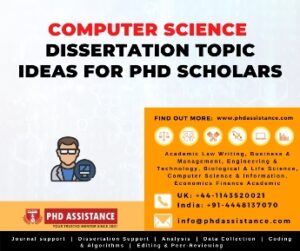COMPUTER SCIENCE DISSERTATION TOPIC IDEAS FOR PHD SCHOLAR
FIND RESEARCH TOPIC
Dissertations are among the most important pieces of work which students complete at university. And they allow you to work individually and on something that truly attracts you. Computer science is a hot field for researchers. Many topic ideas can be generated for a dissertation in this special branch of engineering. Project management, AI, computer networks or applications, security, information systems, and the virtualization of computer interfaces are all major fields of research in the field of computer science. So it is easy to find topics for dissertation in this field but students often get overwhelmed by the huge number of choices they are offered. Let’s explore some of them:

CREATING A STRUCTURE TO IMPROVE THE DURABILITY OF EMBEDDED DEVICES
Embedded devices are vulnerable to external disruptions such as high-energy particles, electromagnetic interference, and temperature changes. These things cause run-time errors in the executing program. As a consequence, expertise with software-implemented durability approaches to diagnose these run-time errors can be obtained.
- Project Goal:
The goal of this concept is to transform the findings of previous studies into a resilience system. That will allow an organization to set up a consulting business for resilient embedded software. The idea will not only reinforce the established resilience methods on industrial embedded software by using many industrial use cases. It will also expand the enabling software to accommodate a broader variety of hardware and industrial requirements.
5TH GENERATION SECURITY TELECOMMUNICATIONS SERVICES
The telecom industry is transitioning to virtualized and structured ecosystems. This facilitates the implementation of Virtual Network Functions (VNFs) on cloud networks and network slicing (Liu and Liu, 2021). Modern lightweight virtualization technologies (Docker) and container orchestration frameworks (Kubernetes) add to this driver. But they do not satisfy the strict security standards of communication systems.
- Project Objectives:
The objectives of this project idea are:
- To form an international and inter-disciplinary study community. This will consist of Early-Stage-Researchers (ESRs) and senior Researchers. The ESRs will gain transferable soft and tech skills, that will help them advance their careers in the telecom industry (Ahmed et al.,2021). The innovative project model will attain intellectual excellence and leadership-driven study. This will also give rise to a clear industry- and innovation-oriented mentality, to develop strategic skills for securing future mobile networks, with a comprehensive understanding of legal and business perspectives.
- To plan, deploy, and launch a series of key components for stable lightweight virtualization and container orchestration technologies for emerging 5G networks. That will provide a solid, well-understood, and structured notion of protection while still complying with legal data privacy requirements. These key elements would be a vital asset in the telecom company’s success in 5G growth.
AI IN CYBERSECURITY
Given that AI applications are becoming more capable and autonomous as they learn through experience, AI in Cybersecurity (CS) can progress beyond the existing stagnant phase of data analytics, which is neither adaptive nor self-learning (Asif et al.,2021). In light of this, cybersecurity researchers should use existing AI technologies to progress. Some of the recent research topics are
- Practical AI for Cybersecurity
- Role of artificial intelligence in the Internet of Things (IoT) cybersecurity
- AI reflections in 2020
USE OF ML/DL IN CYBER SECURITY
They should use their experience of ML and DL in security analytics use cases to examine the functional constraints and precision versus computational complexity trade-offs of ML for CS adoption (Sarker, 2021). It will strengthen ML’s effectiveness in hostile environments for parallel defense use cases.
- Project benefit:
This project’s expertise will be extended in industrial use cases in the CS realms of data governance, network management, and firmware safety. Such research would greatly advance AI for CS. It will result in innovative security technologies that are much superior to the recent advancements. Some of the research topics are
- Cyber Attack Detection Using Spatio Temporal Patterns
- Cyber Security with AI—Part I
- Performance evaluation of Convolutional Neural Network for web security
ANONYMITY AND CONFIDENTIALITY IN AN IOT ENVIRONMENT
This idea seeks suitable solutions for implementing advanced access control in an IoT space. The new methods would allow for greater flexibility, resilience, and protection for IoT devices. This will do so by using IoT systems to evaluate the user’s scope righteously and then modifying the appropriate authentication protocol and the current authorization rules based on this scenario (Shahidinejad et al., 2021). Furthermore, some of the implementations can be used to cover a subset of the IoT devices operated by the customer. Some of the recent research topics are
- Lightweight and Anonymity-Preserving User Authentication Scheme for IoT-based Healthcare
- An anonymity communication protocol for security and privacy of clients in IoT-based mobile health transactions
WIRELESS, UBIQUITOUS, AND DEPENDABLE IOT DEVICE CONTROL
Condition-based monitoring (CBM) in industrial environments integrates sensors and data processing to track machines and operations. This enhances product efficiency and minimizes downtime (Nacchia et al.,2021). Working without cables shortens sensor startup times. It also lowers installation costs, and allows measurements deep within a system. However, cutting network and power cables lead to major computing and energy management problems.
- Purpose of the project:
This study would establish a revolutionary CBM approach that will reduce sensor cables while retaining data quality and reliability (Valeti. and Pakzad, 2021). By continuous, auto-monitoring of system energy usage, this approach will ensure a multi-decade operational life. It lowers bandwidth requirements on sluggish, restricted wireless IoT networks by using data processing specific to the application on the sensor itself.
The resulting hardware/software prototype will have an extended developer-specified lifespan. This can withstand harsh operating conditions, and can be remotely reconfigured.
Concluion
The study of computers and technical processes is often referred to as computer science. It also points to the philosophies and practices that have been implemented to strengthen information technology (IT). So vast is this world of computer science that there is no shortage of dissertation topic ideas. I hope this blog has given you some ideas about what subject you can pick for your dissertation.
Reference
- Liu, M. and Liu, F., 2021. Research on Optimized Deployment of Virtual Network Functions in Network Function Virtualization Environment. In Journal of Physics: Conference Series(Vol. 1748, No. 3, p. 032020). IOP Publishing.
- Ahmed, S.Z., Hjorth, A., Rafner, J.F., Weidner, C.A., Kragh, G., Jensen, J.H.M., Bobroff, J., Nielsen, K.H. and Sherson, J.F., 2021. A training programme for early-stage researchers that focuses on developing personal science outreach portfolios. arXiv preprint arXiv:2103.03109.
- Asif, R., Ghanem, K. and Irvine, J., 2021. Proof-of-PUF enabled Blockchain: concurrent data and device security for Internet-of-Energy. Sensors, 21(1), p.28.
- Sarker, I.H., 2021. Deep Cybersecurity: A Comprehensive Overview from Neural Network and Deep Learning Perspective.
- Shahidinejad, A., Ghobaei-Arani, M., Souri, A., Shojafar, M. and Kumari, S., 2021. Light-Edge: A Lightweight Authentication Protocol for IoT Devices in an Edge-Cloud Environment. IEEE Consumer Electronics Magazine.
- Nacchia, M., Fruggiero, F., Lambiase, A. and Bruton, K., 2021. A Systematic Mapping of the Advancing Use of Machine Learning Techniques for Predictive Maintenance in the Manufacturing Sector. Applied Sciences, 11(6), p.2546.
- Valeti, B. and Pakzad, S.N., 2021. Hybrid data+ model‐based submodeling method for a refined response estimation at critical locations. Structural Control and Health Monitoring, 28(1), p.e2646.
- Muthirayan, D. and Khargonekar, P., 2021. Cognitive Preadaptation for Resilient Adaptive Control. In AIAA Scitech 2021 Forum(p. 0786).
- Das, R. (2021). Practical AI for Cybersecurity.
- Kuzlu, M., Fair, C., & Guler, O. (2021). Role of artificial intelligence in the Internet of Things (IoT) cybersecurity. Discover Internet of Things, 1(1), 1-14.
- Jobin, A., Man, K., Damasio, A., Kaissis, G., Braren, R., Stoyanovich, J., … & Luengo-Oroz, M. (2021). AI reflections in 2020. Nature Machine Intelligence, 3(1), 2-8.
- Anandamurugan, S., Dharani, M., Jaiaswath, R. G., & Jeeva, S. (2021). Cyber Attack Detection Using Spatio Temporal Patterns. Annals of the Romanian Society for Cell Biology, 1439-1447.
- Chander, B., & Kumaravelan, G. (2021). Cyber Security with AI—Part I. In The” Essence” of Network Security: An End-to-End Panorama (pp. 147-171). Springer, Singapore.
- Jemal, I., Haddar, M. A., Cheikhrouhou, O., & Mahfoudhi, A. (2021). Performance evaluation of Convolutional Neural Network for web security. Computer Communications.
- Masud, M., Gaba, G. S., Choudhary, K., Hossain, M. S., Alhamid, M. F., & Muhammad, G. (2021). Lightweight and Anonymity-Preserving User Authentication Scheme for IoT-based Healthcare. IEEE Internet of Things Journal.
- Attarian, R., & Hashemi, S. (2021). An anonymity communication protocol for security and privacy of clients in IoT-based mobile health transactions. Computer Networks, 190, 107976.
 Previous Post
Previous Post
